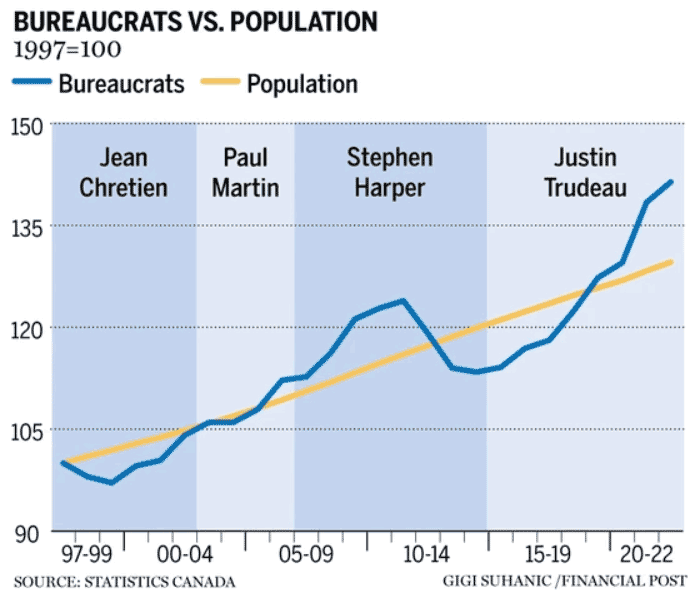The one big growth industry of the Trudeau years—the bureaucracy

In the 1980s, Margaret Thatcher and Ronald Reagan successfully combatted their countries’ large fiscal deficits with policies that included cuts to the number of bureaucrats employed in their respective countries. Recent Canadian governments also used these policies to deal with fiscal deficits, as the chart below shows. It tracks the number of federal civil servants against population from the late 1990s until now, with 1997=100 for both series.
When Jean Chrétien became prime minister in 1993 the federal deficit was at record peacetime levels. His government’s 1995 budget cut spending sharply and reduced the number of bureaucrats. As the chart shows, from 1997 to 1999 their number fell three per cent, even as the population rose two per cent. Restrictive fiscal policy worked and in fact led to a modest increase in the bureaucracy during the next four years. By 2003 the growth rates of population and bureaucrats were the same. That continued for the first two years of Paul Martin’s tenure (2004-05) though the bureaucracy then proceeded to grow two percentage points faster than population.

The Harper government’s economic policies were greatly influenced by the severe global financial crisis that started in 2008. In large part to deal with the problems the crisis caused, the bureaucracy grew rapidly until 2011, exceeding population growth by eight percentage points.
After the crisis abated, however, the Harper government shrank the bureaucracy by a record-setting 10 percentage points, which more than made up for the large increases during the preceding four years. After that the number of bureaucrats levelled off. But in 2015 their cumulative growth since 1997 was seven percentage points below that of the population.
With the election of Justin Trudeau in 2015, however, the federal bureaucracy started to grow rapidly. By 2022 it had grown 27 percentage points, which put it nine percentage points ahead of population growth. Note that this rapid growth of the bureaucracy started well before COVID struck. Under Justin Trudeau, Canada has faced large and growing fiscal deficits. The 2023 federal budget was supposed to address that with a wide range of policies, but none mandates reductions in the size of the bureaucracy.
Anyone who has lived through the last three decades, as the prime minister has, should know about the important role reductions in government employment have played in eliminating the deficits of the governments of Jean Chrétien, Paul Martin and Stephen Harper, not to mention Margaret Thatcher and Ronald Reagan. The credibility and likely the success of Trudeau’s own policies suffer by the absence of such reductions.
Reducing the size of the bureaucracy has at least two beneficial effects. Most obvious is the saving of bureaucrat salaries and benefits. In 2021, according to a study published by the Fraser Institute, wages alone in the public sector were 8.5 per cent higher than those of their private-sector counterparts while the public sector also generally enjoyed more generous pensions and earlier retirement.
But there are also important non-fiscal benefits from cutting bureaucracy. The remaining staff must deal with the public by applying regulations more flexibly and using less paperwork, changes that would be welcomed by most Canadians. In addition, some functions will be carried out with fewer staff or terminated completely, reversing the growth in numbers that bureaucrats have been able to attain when fiscal conditions were normal. As Oscar Wilde put it: “The bureaucracy is expanding to meet the needs of the expanding bureaucracy.”
Whenever the opportunity to cut bureaucracy arises, we should take it, for as Thomas Sowell has written, “A government bureau is the nearest thing to eternal life we’ll ever see on this Earth!”
Author:
Subscribe to the Fraser Institute
Get the latest news from the Fraser Institute on the latest research studies, news and events.

